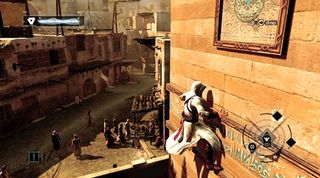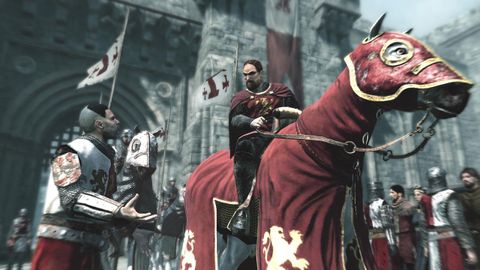Those crowds are your hiding places. Assassin’s Creed is the first game we’ve played to explore the idea of social stealth: using people to mask your approach. It partly succeeds. The success: gently pressing into the throng - pushing beggars aside, joining in the crush - is a rare and novel thrill. The problem: these crowds aren’t actually used for hiding from your kills. Most of your targets are safe behind locked gates or indoors; they’ll only appear once you’ve investigated their routine. These investigations take up far more play-time than the kills; so they had better be interesting.

Hmph. There are nine targets in Assassin’s Creed (although some late-game shenanigans extend that number), and each requires investigation by the ludicrous Assassin’s Bureau before you’re given permission to strike. The problem: every investigation is basically the same. Enemies of the target talking loudly on street corners can be eavesdropped upon. Servants or workers can be followed and pick-pocketed. Allies can be followed to a secluded alley and bullied until they cough up information. (The PC version offers a few, very minor, extra missions over the 360 and PS3 releases. Those who have already tried Assassin’s on the consoles - don’t feel obliged to buy this.) What sounds like variety, isn’t. Every mission follows the same formula. Scout the city, climbing lookout points to spot sources of information. Get information. Report what you’ve learned to the Assassin’s Bureau, and strike. This is fine the first few times. By the fifth or six, the formula is stale. By the ninth, rotten.
Open world games shouldn’t be like this. The joy of an open world is in the chance for players to explore at their own pace. To go where they want, when they want, how they want. The giant hulking walls that prevent you from accessing portions of the cities are one failing. Worse is the absolute absence of player-decision in the planning stages. Assassin’s Creed doesn’t ask you to track your target. It asks you to follow blips on a sat-nav until something eventually happens.
Yet there is joy here. The cities are beyond beautiful. They’re incredible. There are moments - whether you’re in a back alley, with pale smog hanging a foot off the floor, or riding the rooftops at full sprint - when the sense of place is extraordinary. More than any other open-world game, it asks you to sit back and enjoy the sights. Jerusalem isn’t like Vice City or San Andreas, to be bombed through on a moped. It is a place to savor. Or to sprint through.

